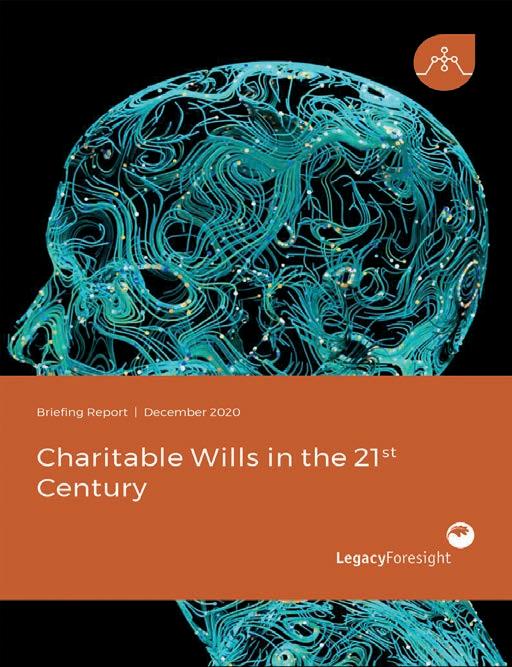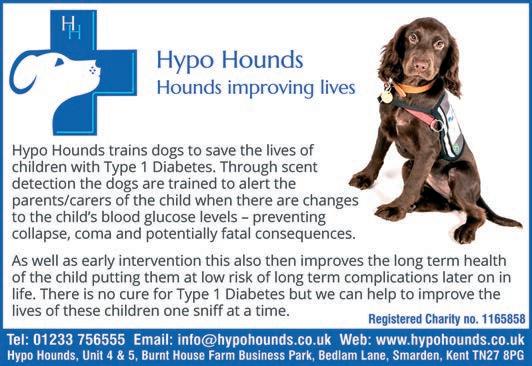
5 minute read
Research project examines wills and legacies now and in the future
[ONE OF THE last activities carried out by Legacy Foresight under its former name was the Charitable Wills in the 21st Century project.
The survey explored will-making and charitable legacies both now and into the future – considering the implications for legacy fundraisers and managers. The project was funded by a consortium of 30 leading charities, whose key findings have been made available.
Remarking on the project, Legacy Foresight said: “We started the project with heads buzzing about the prospect of blockchain (the cryptocurrency technology) wills, the growth of digital assets and the raft of new companies entering the online will-making market. COVID-19 forced relaxation of the rules surrounding the making and witnessing of wills and propelled more people towards online wills. We started to imagine a new landscape that would look very different from today.”
The emphasis of the briefing report issued following the project, however, was on ‘evolution, not revolution’, echoing Pierre Balmain’s famous dictum on fashion.
“Despite temporary relaxations of the rules surrounding making and witnessing wills, the Law Commission is cautious and has other pressing priorities. The experts we spoke to don’t expect an overhaul of our 19th-century will-making laws, or greater regulation of will-writing. Instead, voluntary codes of conduct and more explicit standards seem likely. Likewise, most consumers are fairly conservative in this area, wishing to honour a document they feel should be taken seriously, made securely and protected from fraud.”
Nevertheless, the authors see online willmaking as being ‘here to stay’.
Reviewing the document on the Legacy Foresight blog, donor researcher Sue Pedley writes: “Although fully digital wills are some way off, online wills are undoubtedly here to stay. They’re seen as a lucrative market, and the pandemic has accelerated usage and acceptance. There will be a push factor from suppliers who see considerable value in upselling services, rich digital data and charity partnerships. Over the next five years, we are likely to see a shakeout, as brands jostle for position in a sector that has attracted many new entrants.”
So-called ‘millennials’ are seen as likely to be the first generation to fully embrace the concept.
Sue Pedley continued: “We think that millennials will be the first generation to make a significant change to the way wills are made. They have grown up with digital technology, and in any context expect and accept a range of technical solutions. 19% of millennials with a will currently wrote them online – compared to 8% of all adults – and a similar proportion plan to write their will online the next time around. What’s harder to predict is whether they will become more conservative as they age, but we suspect not.”
The document concludes by looking to ‘Phase 2’ of its work, which will look at how the market has panned out – whether it fits with the trends identified.
“Given the extraordinary circumstances surrounding this year’s project, burning new questions have emerged which are as yet unanswerable. How will the willmaking industry and legacy donors’ needs change in the aftermath of the pandemic? What will this mean for legacy fundraisers, operating in such a tough and uncharted environment? Once the immediate crisis is over, we plan to set up a new phase of research to explore these issues in more detail. We hope that you will join us.”
The industry awaits the results with bated breath.
The briefing report for Charitable Wills in the 21st Century can be downloaded from www.legacyforesight.co.uk. q

Saving lives one sniff at a time
[HYPO HOUNDS provide a viable health care alternative for children and their families by training a Diabetic Alert Dog to detect the subtle changes in the child’s blood sugar levels.
The dogs are trained to alert parents when the child’s sugar levels drop dangerously low or rise too high. This not only impacts on the child but also on the family’s ability to function as a unit, with the registered carer becoming the dog.
Hypo Hounds work is becoming nationally recognised and is literally saving the lives of children – one sniff at a time. q



Until clefts are preventable, help is available worldwide
[TODAY, ONE IN 700 BABIES in the UK are born with a cleft lip and palate, the most common form of birth defect.
The impact on a child’s life as they grow is profound. It may affect not only the way they look, but also their speech, hearing and dental development. And it can leave deep psychological scars.
In the developing world, patients with clefts are frequently not operated on until later in life, if at all. As a result, they may be malnourished and unable to talk well or hear properly. Often, they will be social outcasts.
At CLEFT, our vision is of a future where clefts are preventable. Until we get there, we want to improve the lives of those born with cleft lip and palate – in the UK and in poorer countries around the world.

Join the research effort
By funding research, we continue to make headway into understanding why clefts occur and to deliver pioneering new treatments that deliver kinder, more effective and more efficient care for children with cleft lip and palate.
By supporting the development of cleft centres in low and middleincome countries we aim to give children born with clefts in these poorer countries the same opportunities available to children in the UK. Each donation takes us a step closer to reaching our goal. All gifts could have a direct impact on changing the lives of many hundreds of thousands of babies and children around the world.
Please join us and help us prevent clefts for future generations. q
Research is key to a better life after brain injury

[THE MISSION of Brain Research UK is to fund essential research to discover the causes, develop new treatments and improve the lives of those affected by neurological conditions.
The charity’s current research focus is on areas where there is a realistic chance of making a difference to neurological patients within the short to medium term. This is where the need for charitable funding is most urgent.
As a result they have three current research priorities – brain tumours, brain and spinal cord injury, and headache and facial pain.
Brain Research UK receives no government funding and so relies exclusively on voluntary donations. For further information please visit www.brainresearchuk.org.uk. q




